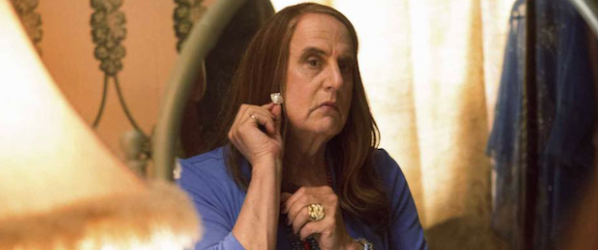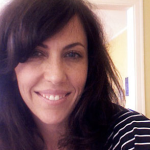What It’s Really Like Inside the Writers Room of Transparent

Five years ago, Bridget Bedard was a Fellow in our Directing Lab. Now she’s working with Jill Soloway as a writer/supervising producer on one of the hottest shows of the year, Transparent, which was just picked up by Amazon for a second season. Bedard, a Film Independent Member, had previously written on Men of a Certain Age and Mad Men. We recently caught up with her to find out what it was like behind the scenes of her latest hit show.
How did you get brought in?
Jill had assembled her entire team of five writers and they were all people who had never worked in television—people she thought were interesting and writers in their own right but they didn’t have experience in television. Amazon urged her to bring in one writer with television experience. She met a bunch of people and we totally hit it off. She hired me and I started within three weeks.
A lot of mentoring happened, which I enjoyed. But for the show, it was a fresh approach because people didn’t have bad habits. They just talked freely about ideas, life experience… It made it more difficult in some ways because everyone had such a huge learning curve, but ultimately it really served the show well.
What was the writing environment like?
Jill just has a lot of great ideas and she somehow, even for all her experience, has managed to not become jaded or stuck in patterns. She just really pushed us to think outside the box at every turn and then on top of that we had Amazon just saying, Go! Yeah! Great! We love it! They almost never gave us a note we didn’t agree with. They gave notes few and far between and they were really good notes.
I was on Mad Men for a season, they gave relatively few notes. But since then, I’ve gone on to network and work on a lot of different shows and it’s a constant barrage of notes, usually bad. Not always. Sometimes the networks can be smart, but sometimes they’re just very afraid, and they kind of want to shave the edges off. Amazon is really new to this, so it’s partly them not knowing that they can give notes, and partly them just being visionary themselves and saying that they trust the writers that they hire and believe in the ideas. It was pretty cool. I’ve never seen anything like it.
It was different from other shows I’ve been on in that Jill likes to focus on emotional truth, which sounds like an obvious thing that you would want to do, but a lot of shows just kind of get stuck in the plot of things and trying to make it work and trying to make a good ‘act out’ for the commercial break, and there’s not a lot of time in the room spent saying, like, ‘Would that really happen? What would really happen and what’s a really interesting way to show this happening?’ Tons of discussion—all very positive, which is another thing that’s different about this show.
It’s different on every show. To different degrees the rooms are ‘safe’ all the way to ‘you’re just afraid to open your mouth.’ In this room there was no wrong thing you could say. That comes directly from Jill encouraging writers, not shutting anyone down. I give her full credit for creating that environment.
Tell us about the writing process.
The early days were the most amazing job ever. We would go into this place in Silver Lake called Materials and Artists. We just hung out and we would talk for six to eight hours a day with lots of breaks and lots of walks and it was all kind of inventive and reflective and we talked about personal stories and everybody cried on day one. Jill just said ‘everyone has to talk for 20 minutes and say something really personal’. First of all, she hired a bunch of people who aren’t afraid to do that, and she also encouraged it. It broke down the walls and nervousness people have and instantly we just felt this bond that we had together. The first person who spoke immediately started to cry and told the most personal story, and then I think that just set the tone, and everyone said, ‘Ok, I have to live up to that.’ It was really cool.
The six writers and Jill break the stories together and at some point the episodes get assigned. So it was, take two or three weeks, write your script, come back, everybody gives notes, do a rewrite. Jill will add her pass on the script. Maybe it will go back to the writer. There’s a lot of ownership. Then the writer goes into pre-production on their script, so they’re in all the meetings for production, casting and the writer is on set every day their episode shoots, and sometimes in the editing room.
How much of your first draft made it to air?
We probably threw about half out and started over. I wrote all the drafts but we kept changing what the idea was, so it changed about 50 percent. And then when we got to set, the actors were so amazing, they improvised a lot. They added a lot of incredible stuff, so it was an evolving process.
How did you feel about that?
At this point, I don’t take it personally at all. I’ve never seen so much love and attention paid to the actors. Up until each take they were adding and contributing, so there was no vibe that the words were just so precious. It was, does it work, does it not work, and is there something better?

Did you have to evolve into that mindset?
Oh yeah. The second or third show you do, you just kind of go, Oh, that’s just what this is. Working with a lot of new writers, I watched a lot of them go through that trauma this season.
Some of the story is so personal to Jill, how did that play into the collaborative process?
Jill is great because the story is incredible personal for her, but she incorporated all of our personal stories too. I feel like everyone in that writers room is in the show in some way. People would tell personal stories and they would become part of the show.
What kind of pressure was there in pre-production?
This is the only show I’ve ever been on where I constantly had a computer to set. We had to have a printer brought to set because we would be rewriting and rewriting stuff that was about to be shot and we would have to print it so Jill could read it, cross out stuff, change it and then we would do it again. That was a lot of pressure.
How do you deal with notes from actors on set?
If they’re good actors, they’re generally right, and they’re usually pointing out something that was glossed over in the writing. But sometimes they’re not right and then you just have to explain what the intention is and almost always they go, ‘Oh okay. I get it now.’ They just need to be able to understand it cause they’re acting it, and if they don’t understand why they’re doing a certain thing it’s very hard for them to make it authentic. Occasionally, when it’s a real disagreement, you just do, Okay, let’s try it both ways. In the editing room you just decide.
Did you do research to help with authenticity regarding the trans community?
We had this incredible reading list, Whipping Girl was the big one. Stuck in the Middle with You, Jennifer Finney Boylan. She’s trans and she was our first consultant. She was with us for a week, which was super helpful. We also had one trans man and one trans woman who were with us throughout the entire process. They came in and out of the room. They would read drafts and say, you know somebody would never say this, or this is more what it would be like. In the episode that I wrote that’s entirely in the past, at cross-dressing camp, we really relied on one of our consultants because she had a very clear idea the differences in dress, attitude, hair, make-up everything between a cross dresser and a trans person, and between drag queens, which is a whole different category. She was really on top of that and helping us with that. They would come to set. They were a vetting process to make sure we weren’t doing something that wasn’t authentic or was just wrong.
How do you think this experience will reshape your approach as a writer?
Jill has inspired me to circle back around to try directing again. That’s the biggest thing. I was just so happy to write on a show that’s very close to my own voice and my sense of humor and the comic-tragic tone. But on top of that I just felt so inspired by her directing and her forcing her way to have that role on the show. I was just so inspired by that. So as soon as I have a minute, I’m going to try to direct something. I’m batting a few things around.
Are you still interested in Operation June Black, the project you workshopped in the Directing Lab?
It’s resurfaced. It’s kind of reinvigorated. I was thinking I ought to dust that off. We did a deeper revision last month—I co-wrote it with my sister—so that we could go out with it again.
Is there something you learned from Jill that you would apply in your work as a director?
As a director, Jill completely loves and respects the actors and I just learned so much from watching her work with them, and I will definitely try to emulate that. And the other thing I learned just from being in the room, she is the most patient person. Sometimes she lets people go on too long or say something that’s taking it in the wrong direction, and she’ll direct it, but she’ll never shut people down, and I was just so impressed with that. She just has so much patience. I was just blown away. It really gave people permission to be creative. She really, really wants to get at the truth of things and that is really rare.
Pamela Miller / Website & Grants Manager